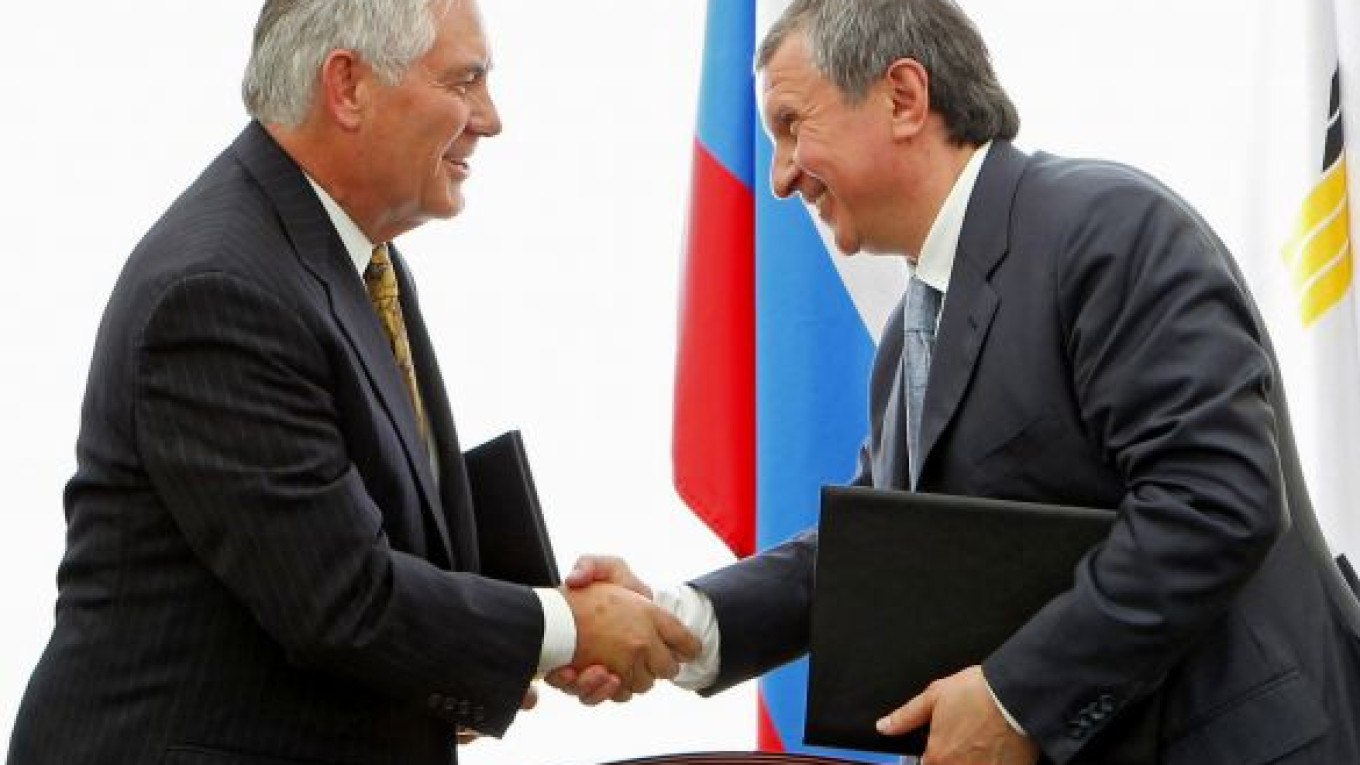Chief executive of Rosneft and Kremlin heavyweight Igor Sechin was made secretary of a new energy commission under President Vladimir Putin on Friday in a move that threatens to undermine Deputy Prime Minister Arkady Dvorkovich and other liberals in the cabinet.
Sechin appeared to have left government last month when he failed to receive a position in Prime Minister Dmitry Medvedev's new cabinet, but the new commission formalizes his continuing influence over energy policy.
A Putin associate of two decades, Sechin joins a group of ministers who served under Putin in government subsequently appointed to powerful positions in the Kremlin.?
Anton Ustinov will take a key organizational role in the commission, Putin's spokesman Dmitry Peskov said Friday, Interfax reported. Ustinov, a former aide to Sechin, played an important part in the dismantling of Mikhail Khodorkovsky's Yukos in the early 2000s.
The exact function of the body, however, is not yet clear. But its remit openly clashes with Dvorkovich's ministerial portfolio, which includes overall responsibility for the energy sector.
Dvorkovich is “wearing too many hats,” said one Western banker who requested anonymity to speak freely. “It's almost as if he's in charge of everything except oil and gas.”
Chaired by Putin, the 45-person commission includes the heads of all major oil, gas and transportation companies, the Finance Minister, the Economic Development Minister, the Energy Minister and the Natural Resources Minister, according to the Kremlin's website.? ?
While Dvorkovich is also a member, the commission appears to be another example of his powerlessness in the face of Sechin's iron grip over the Russian energy industry.
Appointed the chief executive of Rosneft last month, Sechin is also set to return to the board of Rosneftegaz, a holding company that controls the state's 75.16 percent stake in Rosneft and 10.74 percent of Gazprom.
Putin extended the reach of Rosneftegaz in decrees last month that allow it to participate in the upcoming privatizations of major energy sector companies.
Experts suggest that Sechin would like to be the architect of a “national champion” along the lines of Norway's Statoil or Brazil's Petrobras. Such a giant, which could be built on a foundation like Rosneftegaz, has been likened to an “Oil Gazprom.”
Rosneft should consider raising its dividends from 11.5 percent of profit to 25 percent of profit, Putin told Sechin during a signing ceremony between Rosneft and international major ExxonMobil on Friday.
“We will try and carry through your proposal,” Sechin replied, RIA-Novosti reported.
Such an uptick would boost the cash flow to Rosneft's chief shareholder, Rosneftegaz, increasing the finances available for asset purchases.
“They want to strengthen the role of the state in the energy sector,” said Alexander Osin, chief economist at Finam.
Sechin's visibility during the first months of Putin's third term as president has not only been perceived as strengthening an ideology of state capitalism, but emblematic of the weakness of Medvedev's cabinet.
Seven ministers who served under Putin during his four years as prime minister followed him to the Kremlin and received senior appointments that will allow them to continue to wield extensive influence. Sechin served in Putin's cabinet as a deputy prime minister with responsibility for the energy sector.
“Nothing has really changed,” the Western banker said. “The same people are in charge.”
Others point out that Sechin's tightening grip on the political reins in the energy sector has significance for the bitter shareholder conflict between BP and the Alfa, Access and Renova group, or AAR, at the country's third largest oil producer, TNK-BP.
BP announced last month that the company was considering selling its stake in the venture for an estimated $30 billion. While AAR has said it is prepared to buy out their partners, media reports suggest that there is also interest from state-owned companies.?
“The central issue now is … a giant battle between Sechin's Rosneft and [Mikhail] Fridman's Alfa Group,” said Anders Aslund, a senior fellow at the Peterson Institute. “If Fridman wins, the private sector will expand, but if Sechin wins the state sector will expand.”? ? ?
The Kremlin commission, signed into being by Putin on Friday, formalizes an unofficial gathering of oil executives and politicians — an “Oil Club” — that was set up and organized by Sechin during his time as deputy prime minister.
But there are more questions than answers about how it will interact with other agencies that determine policy, said Denis Borisov, an oil analyst at Nomos Bank. Potential areas of conflict include not only the commission's relationship with Dvorkovich, but also how it will coordinate with the Energy Ministry, which also has an official oversight role in the sector.
The new Energy Minister, Alexander Novak, was a surprise choice for many when he was appointed from the Finance Ministry last month and has yet to make his mark.
Dvorkovich was forced to deny Friday that Putin and Sechin's new commission will hamper his work.? “It will not paralyze” energy policy administration, Dvorkovich said, Interfax reported.
A Message from The Moscow Times:
Dear readers,
We are facing unprecedented challenges. Russia's Prosecutor General's Office has designated The Moscow Times as an "undesirable" organization, criminalizing our work and putting our staff at risk of prosecution. This follows our earlier unjust labeling as a "foreign agent."
These actions are direct attempts to silence independent journalism in Russia. The authorities claim our work "discredits the decisions of the Russian leadership." We see things differently: we strive to provide accurate, unbiased reporting on Russia.
We, the journalists of The Moscow Times, refuse to be silenced. But to continue our work, we need your help.
Your support, no matter how small, makes a world of difference. If you can, please support us monthly starting from just $2. It's quick to set up, and every contribution makes a significant impact.
By supporting The Moscow Times, you're defending open, independent journalism in the face of repression. Thank you for standing with us.
Remind me later.


